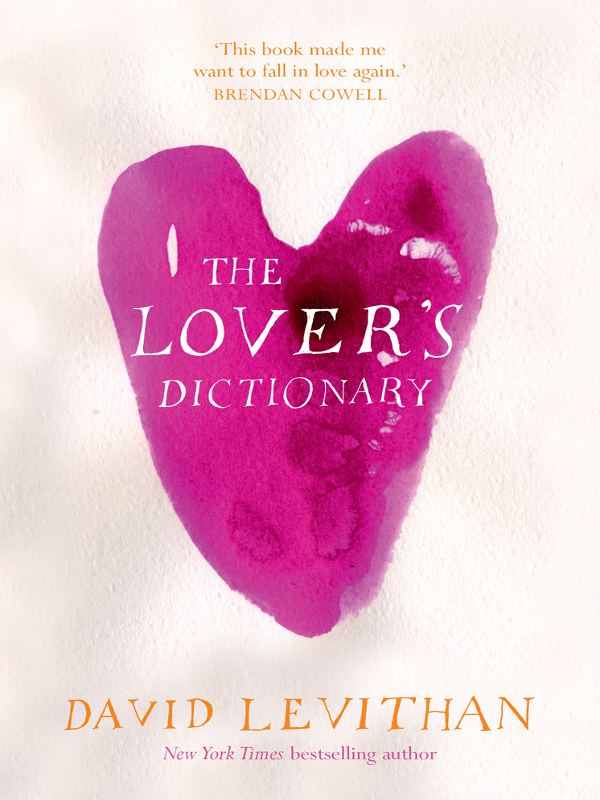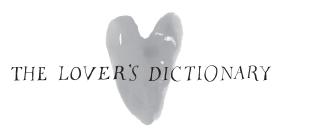
- •Lover's
- •Contents
- •It was after sex, when there was still heat and mostly
- •Ing everything. Most of the time, we don’t even realize
- •I felt silly for even mentioning it, but once I did, I knew I had to explain.
- •I know you haven’t slept. I know you’ve spent the night
- •I will admit: When I got home that night, I went to
- •I still see that now. Less when we’re alone. More
- •I was glad I hadn’t known I was in a contest; I don’t
- •I never understood why anyone would have sex on the
- •I found myself thinking of our verbal exchanges in terms of the verbs we’d use to transcribe them. Every time I


David Levithan is the author of many
acclaimed novels, including Boy Meets Boy,
the
New York Times bestselling Will Grayson,
4/223
Will Grayson
(with John Green), and Nick & Norah’s In-
finite Playlist
(with Rachel Cohn), which was adapted into
a popular
movie. He is also an editorial director at
Scholastic in
New York. David lives in New Jersey.

THE
Lover's
DICTIONARY
DAVID LEVITHAN
![]()
The paper used in this book is manufactured only from
wood grown in sustainable regrowth forests.
The Text Publishing Company
Swann House
22 William Street
Melbourne Victoria 3000
Australia
textpublishing.com.au
Copyright © David Levithan 2011
The moral right of the author has been asserted.
All rights reserved. Without limiting the rights under copyright above, no part of this publication shall be reproduced, stored in or introduced into a retrieval system, or transmitted in any form or by any means (electronic, mechanical, photo-copying, recording or otherwise), without the prior permission of both the copyright owner and the publisher of this book.
7/223
Originally published in 2011 by Farrar, Straus and Giroux, New York
This edition published by The Text Publishing Company 2011
Cover design by W. H. Chong
Text design by Jonathan D. Lippincott
National Library of Australia Cataloguing-in-Publication entry Author: Levithan, David.
Title: The lover’s dictionary / David Levithan.
ISBN: 9781921656910 (pbk.)
Dewey Number: 813.6
For my parents, with gratitude and wonder

Contents
A
B
C
D
E
F
G
H
I
J
K
L
M
N
O
11/223
P
Q
R
S
T
U
V
W
X
Y
Z
acknowledgments
A
aberrant, adj.
“I don’t normally do this kind of thing,” you said.
“Neither do I,” I assured you.
Later it turned out we had both met people online
before, and we had both slept with people on first dates before, and we had both found ourselves falling too fast before. But we comforted ourselves with what we really
meant to say, which was: “I don’t normally feel this good about what I’m doing.”
Measure the hope of that moment, that feeling.
Everything else will be measured against it.
abstain, v.
I’m sorry I was so surprised you didn’t drink that night.
“Is something wrong?” I asked. It wasn’t like you to
turn down a drink after work.
“Go ahead,” you said. “Drink for both of us.”
So I ordered two Manhattans. I didn’t know whether
to offer you a sip. I didn’t know if it could be this easy to get you, for once, to stop.
“What’s wrong?” I asked.
After a dramatic pause, you said, totally serious, “I’m
pregnant.” And then you cracked up.
I laughed even though I didn’t feel like laughing. I
raised my Manhattan, tipped it a little in your direction, then asked, “Whose is it?”
abstraction, n.
Love is one kind of abstraction. And then there are those nights when I sleep alone, when I curl into a pillow that isn’t you, when I hear the tiptoe sounds that aren’t
yours. It’s not as if I can conjure you there completely. I must embrace the idea of you instead.
abyss, n.
There are times when I doubt everything. When I regret
everything you’ve taken from me, everything I’ve given
you, and the waste of all the time I’ve spent on us.
acronym, n.
I remember the first time you signed an email with
SWAK. I didn’t know what it meant. It sounded violent,
like a slap connecting. SWAK! Batman knocking down
the Riddler. SWAK! Cries of “Liar! Liar!” Tears. SWAK!
So I wrote back: SWAK? And the next time you wrote, ten minutes later, you explained.
I loved the ridiculous image I got from that, of you
leaning over your laptop, touching your lips gently to
the screen, sealing your words to me before turning
them into electricity. Now every time you SWAK me, the
echo of that electricity remains.
adamant, adj.
You swore that Meryl Streep won the Best Actress Oscar
for Silkwood. I said, no, it was Sophie’s Choice. The way you argued with me, you would have thought we were
debating the existence of God or whether or not we
should move in together. These kinds of fights can never be won — even if you’re the victor, you’ve hurt the other person, and there has to be some loss associated with
that.
We looked it up, of course, and even though you con-
ceded I was right, you still acted like it was a special occasion. I thought about leaving you then. Just for a split second, I was out the door.
akin, adj.
I noticed on your profile that you said you loved Charlotte’s Web. So it was something we talked about on that first date, about how the word radiant sealed it for each of us, and how the most heartbreaking moment isn’t
when Charlotte dies, but when it looks like all of her
children will leave Wilbur, too.
In the long view, did it matter that we shared this?
Did it matter that we both drank coffee at night and
both happened to go to Barcelona the summer after our
senior year? In the long view, was it such a revelation
that we were both ticklish and that we both liked dogs
more than cats? Really, weren’t these facts just place-
holders until the long view could truly assert itself?
We were painting by numbers, starting with the
greens. Because that happened to be our favorite color.
And this, we figured, had to mean something.
alfresco, adv.
We couldn’t stand the city one minute longer, so we
walked right into the rent-a-car place, no reservation,
and started our journey upstate. As you drove, I called
around, and eventually I found us a cabin. We stopped
at a supermarket and bought a week’s worth of food for
two nights.
It wasn’t too cold out, so we moved the kitchen table
outside. The breeze kept blowing out the candles, but
that didn’t matter, because for the first time in our relationship, there were plenty of stars above us.
The wine set the tone of our conversation — languid,
tipsy, earthy.
“I love dining alfresco,” you said, and I laughed a
little.
“What?” you asked.
And I said, “We’re not naked, silly.”
Now it was your turn to laugh.
“That’s not what it means,” you told me. “And any-
way, don’t you feel naked now?”
20/223
You fell quiet, gestured for me to listen. The sound of
the woods, the feel of the air. The wine settling in my
thoughts. The sky, so present. And you, watching me
take it all in.
Naked to the world. The world, naked to us.
aloof, adj.
It has always been my habit, ever since junior high
school, to ask that question:
“What are you thinking?”
It is always an act of desperation, and I keep on ask-
ing, even though I know it will never work the way I
want it to.
anachronism, n.
“I’ll go get the horse and buggy,” you’ll say.
And I’ll say, “But I thought we were taking the
hovercraft!”
anthem, n.
It was our sixth (maybe seventh) date. I had cooked and
you had insisted on doing the dishes. You wouldn’t even
let me dry. Then, when you were done, smelling of suds,
you sat back down and I poured you another glass of
cheapish wine. You put your legs in my lap and slouched
as if we’d just had a feast for thousands and you’d been the only chambermaid on duty to clean it up.
There was a pause. I was still scared by every gap in
our conversation, fearing that this was it, the point
where we had nothing left to say. I was still trying to impress you, and I still wanted to be impressed by you, so I could pass along pieces of your impressiveness in stories to my friends, convincing myself this was possible.
“If you were a country,” I said, “what would your na-
tional anthem be?”
I meant a pre-existing song — “What a Wonderful
World” or “Que Sera, Sera” or something to make it a
joke, like “Hey Ya!” (“I would like, more than anything
else, for my nation to be shaken like a Polaroid
picture.”)
24/223
But instead you said, “It would have to be a blues
song.” And then you looked up at the ceiling, closed your eyes, and began to sing a blues riff:
Nuh-nah-nuh-nuh
My work makes me tired
Nuh-nah-nuh-nuh
But I gotta pay my rent
Nuh-nah-nuh-nuh
My parents never loved me
Nuh-nah-nuh-nuh
Left all my emotions bent
Nuh-nah-nuh-nuh
I know what I’m here for
Nuh-nah-nuh-nuh
Make your dishes so clean
Nuh-nah-nuh-nuh
Just be careful what you wish for
Nuh-nah-nuh-nuh
’Cause most my shit is unseen
Nuh-nah-nuh-nuh
So many men
Nuh-nah-nuh-nuh
Fall into my trap
Nuh-nah-nuh-nuh
But, boy, I gotta tell you
Nuh-nah-nuh-nuh
25/223
You might rewrite that map
Nuh-nah-nuh-nuh
Because I’m a proud nation
Nuh-nah-nuh-nuh
It’s written here on my flag
Nuh-nah-nuh-nuh
It’s a fucked-up world, boy
Nuh-nah-nuh-nuh
So you better make me laugh
Then you stopped and opened your eyes to me. I
applauded.
“Don’t sit there clapping,” you said. “Rub this blues
singer’s feet.”
You never asked what my anthem was. But that’s
okay, because I still don’t know what I’d answer.
antiperspirant, n.
“There is nothing attractive about smelling like baking
powder,” I said.
“Baking soda,” you corrected.
“So if I want to make a pound cake, I can throw some
butter, flour, and sugar into your armpit —”
“Why are we having this conversation? Remind me
again?”
“You no longer smell the yeasty goodness that you
apply under your arms, because you are completely used
to it. I, however, feel like I am dating a Whole Foods.”
“Fine,” you said.
I was surprised. “ ‘Fine’?”
“Let the record show, I have stepped onto the slip-
pery slope of compromise in the name of promoting
peace and harmony. There will be a ceremonial burning
of the deodorant in ten minutes. I hope it’s flammable.”
“It’s just that I really hate it,” I told you.
“Well, I hate your toe hair.”
27/223
“I’ll wear socks,” I promised. “All the time. Even in
the shower.”
“Just be warned,” you said. “Someday you’ll ask me
to give up something I really love, and then it’s going to get ugly.”
antsy, adj.
I swore I would never take you to the opera again.
arcane, adj.
It was Joanna who noticed it first. We were over at her
house for dinner, and she said something about being
able to see the woman across the street doing yoga in
the mornings, and how strange it looked when you were
watching it from a distance.
“So how is Miss Torso doing?” you asked.
And I said, “Perhaps we should ask the pianist.”
Joanna just looked at us and said, “It used to be that
you each had your own strange, baffling references. Now
you have them together.”
People often say that when couples are married for a
long time, they start to look alike. I don’t believe that.
But I do believe their sentences start to look alike.
ardent, adj.
